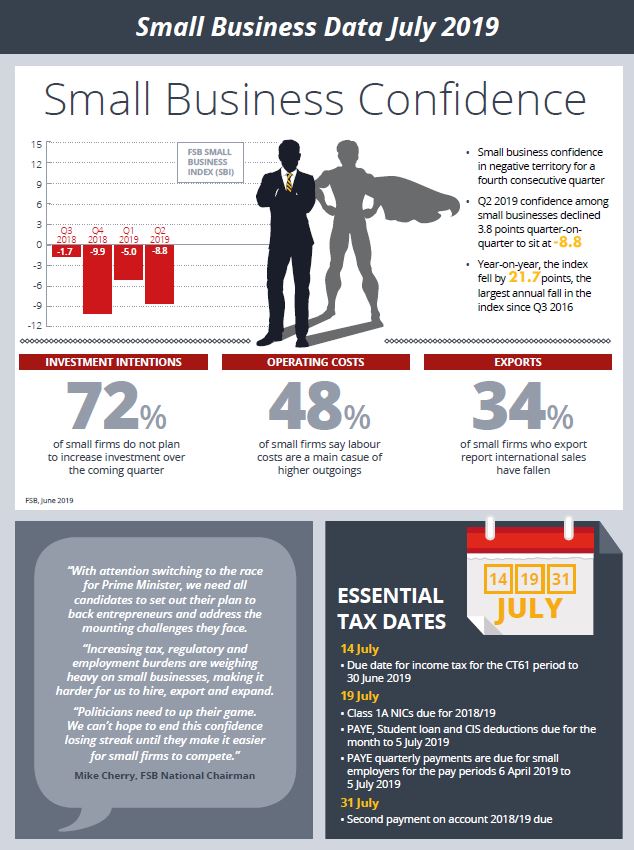Business Review July 2019
INCREASED CYBER THREAT TO SMEs
A study undertaken by insurer Hiscox has revealed that more than six out of ten UK small businesses suffered at least one serious cyber-attack in the last year.
The third Hiscox Cyber Readiness Report shows that, for the first time, a significant majority of firms surveyed have suffered a cyber-attack in the last 12 months. In addition to a rise in the frequency of attacks, the data also revealed that many small businesses were experiencing a significant increase in the costs of dealing with cyber-attacks.
It is perhaps therefore unsurprising that the survey also found that twothirds of small businesses are planning to increase the amount they currently spend on cyber security by 5% or more.
Commenting on the findings Gareth Wharton, Cyber CEO, said: “Both the cost and frequency of attacks have increased markedly compared with a year ago, and where hackers formerly focused mainly on larger companies, small and mediumsized firms are now equally vulnerable. The old adage ‘prevention is better than cure’ springs to mind, and being aware of these threats is half the battle.”
CONCERN OVER DEARTH OF DIGITAL SKILLS
A new report conducted by the Confederation of British Industry (CBI) in association with Tata Consultancy Services has revealed deep concern amongst employers about the UK’s widening digital skills gap.
The survey of 250 firms found that 67% have unfilled digital vacancies, with only 31% feeling confident that they will be able to access the digital skills they require over the next three to five years. The research also found that 69% of smaller firms expect their digital needs to peak in the next one to two years, which suggests that steps need to be
taken now in order to address this potential skills shortfall.
Mark Fell, CBI Chief UK Policy Director, commented: “It’s essential we tackle the UK’s digital skills crunch now to remain internationally competitive, and promote the UK as the number one place for businesses to invest. Firms are sounding the alarm in their struggle for digital skills and the uncertainty that brings. With companies fishing in the same pool for talent, there’s a clear need for businesses to diversify their hiring strategies and look for innovative ways to help their people improve their digital skills.”
TYPICAL SME VALUATIONS REVEALED
Research conducted by finance provider MarketInvoice has found that the typical UK SME now has a company valuation in excess of £2.9 million.
The latest MarketInvoice Business Insights survey, which aims to shed light on company valuations and key priorities among business owners, also found that two-thirds of owners consider company valuation to be a huge priority to them.
Interestingly, SMEs within the education sector were found to have the largest average valuations with the typical education business worth around £4 million. Business owners within this sector were also most likely to worry about company valuation, with just over eight out of ten citing it as something they think about all the time.
Business owners also cited a number of other factors in addition to company financials that contribute to company value. Indeed, of those surveyed, 17% regarded their premises, 15% their product and 15% their people, to be key factors that contribute to the value of their business.
There was also evidence that a significant proportion of SMEs are thinking about global ambitions. When asked about global expansion, more than half of all business owners hoped to open offices abroad and start exporting overseas, with this ambition strongest amongst smaller SMEs.
GETTING THE BALANCE RIGHT
A recent survey of 2,000 workers conducted by YouGov, for the online recruitment platform Indeed, has highlighted the increasing importance of work-life balance to the UK’s workforce, particularly millennials.
The study found that 55% of respondents regard work-life balance to be a key aspect of work. Furthermore, 74% said they would be able to perform their current job just as effectively in four days, with this figure rising to 79% amongst millennials.
Pay is still regarded as the main area of concern for over half of UK workers, with 57% of those polled citing their salary as the most important factor in their work. However, it was found that those who prioritise work-life balance would be satisfied on a lower wage for the right job: £49,000 on average compared to £55,000 for those who do not prioritise a work-life balance.
Other factors cited as being important include job security (45%), colleagues (40%), length and convenience of the commute (34%), financial benefits such as a pension (20%) and the culture of the organisation in which people work (12%).
The findings of the report highlight the need for employers keen to attract and retain the best employees, to ensure they are meeting the expectations of workers in today’s competitive labour market.
POLITICAL UNCERTAINTY TAKING ITS TOLL
The latest Small Business Index (SBI) published by the Federation of Small Businesses (FSB) paints an ominous picture as political uncertainty continues to hit confidence among small firms.
Second quarter data has revealed that many small businesses are struggling to expand, hire and raise productivity levels, while the SBI confidence measure fell to -8.8, a fourth consecutive negative quarterly reading – this is the first time this has happened since the index was launched in 2010. And the FSB squarely blames the situation on politicians whose handling of Brexit is increasingly leaving the small business community hamstrung.
Of particular concern is the drop in investment intentions, with SBI data suggesting that 72% of small firms are not planning to increase capital investment in the coming quarter. This finding comes on the back of Office for National Statistics data which showed that business investment fell for four straight quarters last year, for the first time since the financial crash.
Other News
Barriers to growth
The latest Business Barometer from Hitachi Capital has revealed that almost eight out of ten small business owners are struggling with a range of barriers to growth. Top of the list is market uncertainty, with 31% of respondents citing this as a significant factor. Other perceived barriers according to the survey are uncertainty over their own business (17%), red tape (16%), and the tax burden and business rates (16%).
Climate change commitment
The UK government has committed to net zero carbon emissions by 2050. A recent survey found that nine out of ten directors and managers said they believe that business leaders should take steps to mitigate climate change and 80% said their own business is already doing so. Actions already taken to tackle climate change include reducing the amount
of waste produced, introducing energy-saving initiatives across the business and reducing the amount of travel undertaken.
Summer in the office
A study by Captivate suggests productivity in the summer months falls by 20%, while attendance dips by 19% and 45% of workers feel more distracted. The research supports the idea of flexible working over the summer, such as allowing employees to work from home on a Monday or finish early on Friday, while organising summer-related treats such as barbecues or ice-cream socials may also provide your workforce with a much needed summertime boost.

